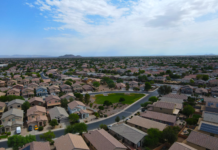As I write this home prices appear to be falling still and, of course, recent experience shows us that they do not always rise from year to year. But not even the most pessimistic analysts think they can keep dropping for too many years. So, where are real estate values headed this year and next?
That is a difficult question. For those who paid attention during the “bubble years,” it was easy to see that a fall was coming. In fact, in a book I wrote in 2006, I mentioned, “By the time you read this, prices of homes are likely going down.” But notice that I said “likely.” It is one thing to see that something is over-valued or that prices are rising at unsustainable rates, but predicting the precise timing of corrections is next to impossible.
That’s true now as well. What we can look at for a clue, though, is the factors that affect the prices. Then, as these change, we will be able to see the bottom-and the appreciation that follows-coming.
One of the key factors is the rate of foreclosures. So far it just keeps climbing. And when banks take back those houses, they can’t sit on them. They need to sell quickly due to regulations regarding their capital requirements. That means they sell cheap, which helps drive down prices in general. So watch for the rate of foreclosures to decline before prices can stabilize or rise.
Another factor is the supply of houses out there. I was recently reading that at the height of the housing boom a large proportion of the homes bought were bought as speculative investments and second homes. People are more likely to be selling second homes than buying them now that the economy is worse. In other words, there may be too many homes available still, which holds down prices. New housing starts are down, so if the population grows, the excess supply will start to be used up.
Population growth is another important factor. Few people realize how much demand for housing was affected by immigrants, legal or illegal. Many illegal immigrants were able to get home mortgages, which has become harder. Even as renters they created demand for houses. Now, with the worsening economy, many who are here illegally are returning to their home countries, and fewer are trying to come here. That may negatively impact demand for a while. A return to higher levels of immigration may help stabilize real estate values.
Unemployment is another factor. As long as the rate keeps growing, it is going to mean fewer people able to buy a home. When you see employment levels rise, there might be more hope for real estate values to rise with them due to increasing demand.
Interest rates are a big factor, and a “wild card” in the whole equation. If they were to go from the current 5 percent to 9 percent, for example, tens of millions of people who now qualify for an average mortgage loan would no longer qualify. That would have to have a dampening effect on any real estate recovery. It is not clear how high rates will rise in the near future, but the massive government borrowing going on will have to push them higher.
Keep an eye on the factors outlined here. As they change in the right direction, real estate values should start to stabilize, and then-hopefully, soon-start to rise again. Meanwhile, look at the current slump as a big sale, with prices discounted up to 40 percent in places.
File photo















![Gila River Bridge construction to begin Monday A screenshot showing an aerial view of the current Gila River bridges on Interstate 10 on an unknown date. [Arizona Department of Transportation]](https://www.inmaricopa.com/wp-content/uploads/2024/05/Screenshot-2024-05-10-154035-100x70.png)
